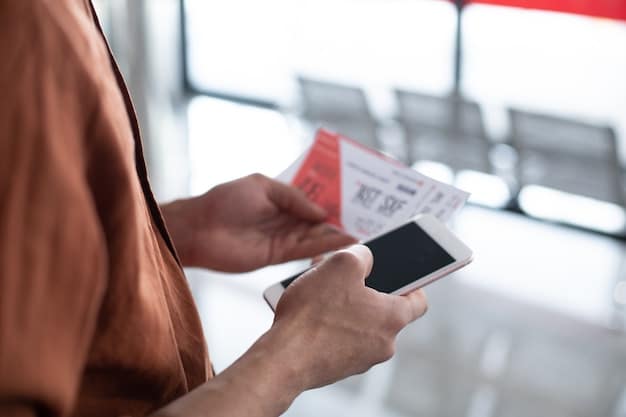Protect Yourself: US Travel Scams and Fraud Prevention in 2025

US Travel Scams in 2025 are evolving, but understanding common fraud techniques, such as fake bookings, phishing, and timeshare schemes, and employing proactive measures like verifying credentials, securing personal information, and utilizing travel insurance, can significantly reduce your risk.
Traveling in the US should be an exciting experience, but unfortunately, the rise of sophisticated scams can turn dream vacations into nightmares. As we approach 2025, it’s crucial to stay informed about the latest US Travel Scams: How to Protect Yourself from Fraud in 2025 to ensure a safe and enjoyable trip.
Understanding the Landscape of US Travel Scams in 2025
The digital age has revolutionized how we plan and book travel, but it has also opened doors for fraudsters. In 2025, travel scams are becoming more sophisticated, targeting unsuspecting travelers with increasingly convincing schemes. Understanding the current landscape is the first step in protecting yourself.
Common Types of Travel Scams
Several types of scams are prevalent in the US travel industry. Recognizing these common tactics is essential for avoiding potential fraud.
- Fake Booking Sites: Scammers create websites that mimic legitimate travel agencies or airlines. These sites lure customers with attractive deals, only to steal their money or personal information.
- Phishing Emails: These emails often appear to be from trusted sources, such as airlines or hotels. They ask for personal information or direct users to fake websites.
- Timeshare Schemes: High-pressure sales tactics are used to convince travelers to invest in timeshares, which often come with hidden fees and restrictions.
Impact on Travelers
The impact of travel scams can be devastating. Beyond the financial losses, victims of these scams often experience emotional distress and a loss of trust in the travel industry.

Being aware of the various types of travel scams and their potential consequences is the first line of defense. Staying vigilant and informed can help you avoid becoming a victim.
In conclusion, the landscape of US travel scams in 2025 is complex and ever-evolving. By familiarizing yourself with common scam tactics and understanding their impact, you can take proactive steps to protect yourself from fraud.
Verifying Credentials and Authenticity
One of the most effective ways to avoid travel scams is to verify the credentials and authenticity of travel providers. Taking the time to confirm that a company is legitimate can save you from a lot of trouble down the road.
Checking Travel Agency Accreditation
Accreditation is a good indicator of a travel agency’s legitimacy. Look for agencies that are accredited by reputable organizations.
- ASTA (American Society of Travel Advisors): ASTA members adhere to a strict code of ethics, ensuring they are trustworthy and reliable.
- CLIA (Cruise Lines International Association): If you’re booking a cruise, look for agencies that are CLIA-certified.
- BBB (Better Business Bureau): Check the agency’s rating and reviews on the BBB website to see if there are any complaints against them.
Confirming Hotel and Accommodation Details
Before booking a hotel or other accommodation, take steps to confirm its existence and verify its details.
Always check the hotel’s official website directly to verify the information provided on third-party booking sites. Look for reviews on multiple platforms, such as TripAdvisor and Google Reviews, to get a balanced perspective.
Validating Airline Tickets and Reservations
To ensure your airline tickets and reservations are valid, take the following precautions.

Always book directly with the airline or through a reputable travel agency. After booking, confirm your reservation on the airline’s website using your booking reference number. Be wary of deeply discounted tickets, as they may be fraudulent.
In conclusion, verifying credentials and authenticity is crucial in protecting yourself from travel scams. By checking accreditations, confirming hotel details, and validating airline tickets, you can significantly reduce your risk of fraud.
Protecting Your Personal and Financial Information
Keeping your personal and financial information secure is paramount when booking travel. Scammers often target this information to commit identity theft and financial fraud.
Using Secure Payment Methods
Choosing the right payment method can provide an extra layer of security.
- Credit Cards: Offer fraud protection and allow you to dispute unauthorized charges.
- PayPal: Provides an additional layer of security by not sharing your financial information with the merchant.
- Avoid Wire Transfers: Never use wire transfers to pay for travel, as they are difficult to trace and offer little recourse if you are scammed.
Safe Online Practices
Adopting safe online practices can help you avoid phishing and other online scams.
Always use strong, unique passwords for your online accounts. Be wary of clicking on links in emails or text messages from unknown senders. Ensure that the websites you visit are secure by looking for “https” in the address bar and a padlock icon.
Monitoring Your Accounts
Regularly monitoring your financial accounts can help you detect and address fraudulent activity quickly.
Check your credit card statements and bank accounts regularly for any unauthorized transactions. Sign up for fraud alerts with your bank or credit card company to receive notifications of suspicious activity.
In conclusion, protecting your personal and financial information is vital for avoiding travel scams. By using secure payment methods, adopting safe online practices, and monitoring your accounts, you can minimize your risk of becoming a victim of fraud.
Recognizing Red Flags and Suspicious Offers
Being able to recognize red flags and suspicious offers is essential for avoiding travel scams. Many scams rely on enticing deals that are too good to be true.
Too-Good-to-Be-True Deals
If a travel deal seems too good to be true, it probably is. Scammers often lure victims with unbelievably low prices to entice them to book quickly.
Question the legitimacy of unusually low prices. Compare prices from multiple sources to see if the offer is consistent with market rates. Be wary of pressure tactics, such as limited-time offers that require immediate payment.
Unsolicited Offers and Communications
Be cautious of unsolicited offers and communications, especially those that come from unknown sources.
Avoid responding to unsolicited emails, phone calls, or text messages offering travel deals. Never give out personal or financial information to unknown parties. Verify the legitimacy of the offer by contacting the company directly through its official website or phone number.
Pressure Tactics and Urgency
Scammers often use pressure tactics and a sense of urgency to push potential victims into making quick decisions.
Be wary of offers that require immediate payment or threaten to expire soon. Take your time to research the offer and the company before making a decision. Trust your instincts; if something feels off, it’s best to walk away.
In conclusion, recognizing red flags and suspicious offers is crucial for protecting yourself from travel scams. By questioning too-good-to-be-true deals, being wary of unsolicited communications, and avoiding pressure tactics, you can significantly reduce your risk of fraud.
Utilizing Travel Insurance and Protection
Travel insurance can provide financial protection and peace of mind in case of unexpected events, including scams and fraud. Understanding the different types of coverage and what they entail is essential.
Types of Travel Insurance Coverage
Different types of travel insurance coverage can protect you from various risks.
- Trip Cancellation/Interruption Insurance: Reimburses you for non-refundable expenses if you have to cancel or interrupt your trip due to unforeseen circumstances.
- Baggage Loss/Delay Insurance: Covers the cost of lost, stolen, or delayed baggage.
- Medical Insurance: Provides coverage for medical expenses incurred during your trip.
Coverage for Scams and Fraud
Some travel insurance policies offer coverage for scams and fraud, but it’s important to understand the terms and conditions.
Review the policy carefully to see if it covers financial losses due to travel scams. Understand the process for filing a claim and the documentation required. Be aware of any exclusions or limitations in the policy.
Filing a Claim
If you fall victim to a travel scam, promptly file a claim with your insurance company.
Gather all relevant documentation, such as booking confirmations, payment receipts, and communication records. File the claim as soon as possible after discovering the scam. Cooperate fully with the insurance company’s investigation.
In conclusion, utilizing travel insurance and protection can provide valuable financial security in case of travel scams. By understanding your coverage, reviewing policy terms, and promptly filing a claim if necessary, you can mitigate the financial impact of fraud.
Staying Updated on the Latest Scams and Trends
Travel scams are constantly evolving, so it’s important to stay updated on the latest trends and tactics. Staying informed can help you recognize and avoid new scams as they emerge.
Following Travel News and Alerts
Staying informed about travel news and alerts is a great way to learn about new scams and potential risks.
Follow reputable travel news websites and blogs, such as Travel + Leisure and Condé Nast Traveler. Sign up for email newsletters from travel agencies and consumer protection organizations. Monitor social media for alerts and warnings about travel scams.
Consulting Consumer Protection Agencies
Consumer protection agencies can provide valuable information and resources for avoiding travel scams.
Visit the websites of the Federal Trade Commission (FTC) and the Better Business Bureau (BBB) for tips on avoiding scams. Contact your state’s attorney general’s office for consumer protection resources. Report any scams you encounter to the FTC and BBB.
Sharing Experiences and Information
Sharing your experiences and information with others can help raise awareness and prevent others from becoming victims of travel scams.
Share your experiences with friends, family, and colleagues. Post reviews and comments on travel websites and forums. Report scams to the authorities and consumer protection agencies.
In conclusion, staying updated on the latest scams and trends is an ongoing effort that can significantly reduce your risk of fraud. By following travel news, consulting consumer protection agencies, and sharing experiences, you can stay one step ahead of the scammers.
| Key Point | Brief Description |
|---|---|
| 🛡️ Verify Credentials | Check accreditation and confirm hotel/airline details. |
| 🔒 Secure Information | Use secure payment methods and monitor accounts. |
| 🚩 Red Flags | Be wary of deals that seem too good to be true. |
| ✈️ Travel Insurance | Ensure coverage for scams. File claims promptly. |
Frequently Asked Questions
▼
Common scams include fake booking sites, phishing emails disguised as airline or hotel communications, and timeshare schemes with high-pressure sales tactics. Always verify the legitimacy of offers.
▼
Check for accreditation with reputable organizations like ASTA or CLIA. Read reviews on multiple platforms such as TripAdvisor, and confirm details directly with hotels or airlines.
▼
Credit cards and PayPal are generally safest, as they offer fraud protection and allow you to dispute charges. Avoid wire transfers, which are difficult to trace and offer little recourse.
▼
Trust your instincts; if a deal seems too good to be true, it probably is. Research the offer, compare prices from multiple sources, and avoid pressure to make an immediate decision.
▼
Some travel insurance policies cover losses due to scams, but it varies. Review your policy’s terms and conditions to see if it includes this coverage and understand the claims process.
Conclusion
Protecting yourself from US Travel Scams: How to Protect Yourself from Fraud in 2025 requires diligence, awareness, and proactive measures. By staying informed, verifying credentials, securing your personal information, and utilizing travel insurance, you can significantly reduce your risk and enjoy a safe and stress-free travel experience in the US.





